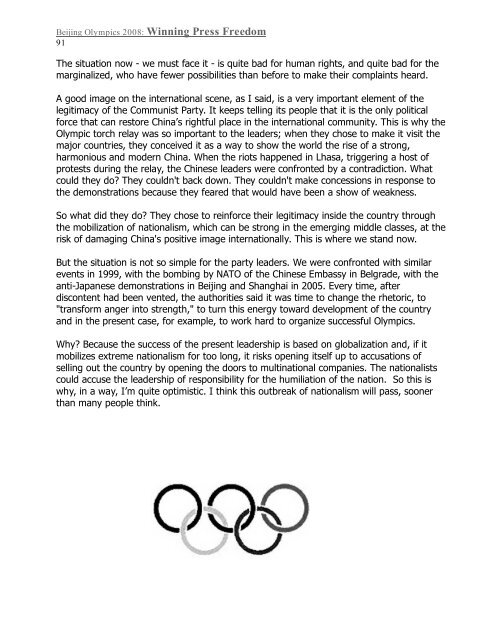Beijing Olympics 2008: Winning Press Freedom - World Press ...
Beijing Olympics 2008: Winning Press Freedom - World Press ...
Beijing Olympics 2008: Winning Press Freedom - World Press ...
You also want an ePaper? Increase the reach of your titles
YUMPU automatically turns print PDFs into web optimized ePapers that Google loves.
<strong>Beijing</strong> <strong>Olympics</strong> <strong>2008</strong>: <strong>Winning</strong> <strong>Press</strong> <strong>Freedom</strong><br />
91<br />
The situation now - we must face it - is quite bad for human rights, and quite bad for the<br />
marginalized, who have fewer possibilities than before to make their complaints heard.<br />
A good image on the international scene, as I said, is a very important element of the<br />
legitimacy of the Communist Party. It keeps telling its people that it is the only political<br />
force that can restore China’s rightful place in the international community. This is why the<br />
Olympic torch relay was so important to the leaders; when they chose to make it visit the<br />
major countries, they conceived it as a way to show the world the rise of a strong,<br />
harmonious and modern China. When the riots happened in Lhasa, triggering a host of<br />
protests during the relay, the Chinese leaders were confronted by a contradiction. What<br />
could they do? They couldn't back down. They couldn't make concessions in response to<br />
the demonstrations because they feared that would have been a show of weakness.<br />
So what did they do? They chose to reinforce their legitimacy inside the country through<br />
the mobilization of nationalism, which can be strong in the emerging middle classes, at the<br />
risk of damaging China's positive image internationally. This is where we stand now.<br />
But the situation is not so simple for the party leaders. We were confronted with similar<br />
events in 1999, with the bombing by NATO of the Chinese Embassy in Belgrade, with the<br />
anti-Japanese demonstrations in <strong>Beijing</strong> and Shanghai in 2005. Every time, after<br />
discontent had been vented, the authorities said it was time to change the rhetoric, to<br />
"transform anger into strength," to turn this energy toward development of the country<br />
and in the present case, for example, to work hard to organize successful <strong>Olympics</strong>.<br />
Why? Because the success of the present leadership is based on globalization and, if it<br />
mobilizes extreme nationalism for too long, it risks opening itself up to accusations of<br />
selling out the country by opening the doors to multinational companies. The nationalists<br />
could accuse the leadership of responsibility for the humiliation of the nation. So this is<br />
why, in a way, I’m quite optimistic. I think this outbreak of nationalism will pass, sooner<br />
than many people think.





